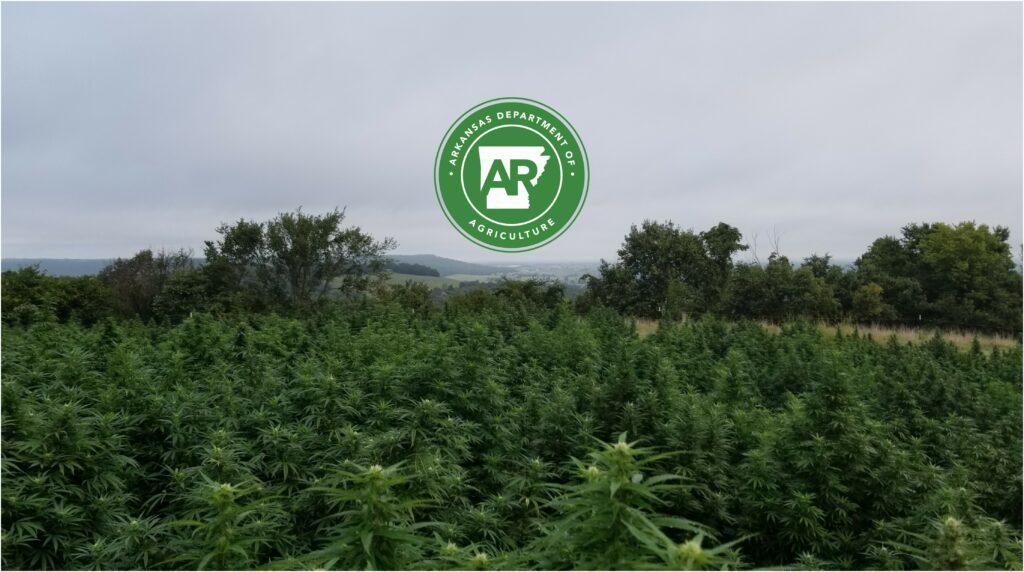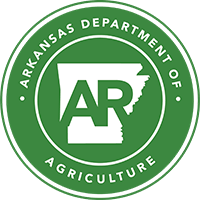Plant Industries
Serving the citizens of Arkansas and the agricultural and business communities by providing information and unbiased enforcement of laws and regulations set by the Arkansas State Plant Board
Agriculture / Plant Industries / Quality Control and Compliance (Feed, Fertilizer, Hemp, Seed) / Hemp Home / Arkansas Hemp Program Overview
Arkansas Hemp Program Overview

PROGRAM OVERVIEW & UPDATES
Program Overview:
The Arkansas Department of Agriculture’s Hemp Program was established to license Hemp Growers and Hemp Processor/Handlers for Arkansas residents, as authorized by state and federal hemp laws. Licensed Hemp Growers can grow, store, market, and harvest hemp, and Licensed Hemp Processor/Handlers can process or handle raw hemp material in the state. Licensed Hemp Processors convert their raw hemp material into “publicly marketable hemp products,” such as hemp seed oil or CBD/cannabinoid oil.
You need a hemp license to do anything with raw hemp material in Arkansas, like growing, storing, handling, selling, or processing. Before selling or transferring hemp into or out of Arkansas, hemp license certificates must be checked and verified between companies/entities.
If you wish to grow, store, process, handle, market, or harvest hemp in Arkansas, you must apply for the appropriate license with the AR Hemp Program. Please visit the Applications for Hemp Licensing for more information.
In 2019, Arkansas started issuing licenses for hemp production after over 80 years of the crop being illegal to grow or cultivate in the state. Arkansas was able to do this under the authority of the 2014 Farm Bill, which permitted states to establish “pilot hemp research programs.” The AR Hemp Research Program ended in 2021 with the introduction of the 2018 Farm Bill and the state’s passing of a new hemp act, the “Arkansas Hemp Production Act of 2021.”
After receiving approval from the United States Department of Agriculture (“USDA”) in December 2021, the Arkansas Department of Agriculture was able to continue regulating hemp production in Arkansas under more commercialized rules permitted by the 2018 Farm Bill and the AR Hemp Production Act of 2021. 2022 was the first year of commercialized hemp production in Arkansas.
The hemp industry in Arkansas and the United States is still somewhat in its infancy, and there is still much to learn. Be cautious when entering this industry as there are many uncertainties and financial risks involved. Supply chains are still developing, hemp varieties are unpredictable, and many regulatory issues remain unsolved at the federal level. Market options for fiber and grain/seed are extremely limited, and prices of floral material have drastically declined within the last few years.
The Department asks farmers/producers to really consider the financial risk before entering the industrial hemp industry. “Don’t plant more than you can afford to lose!”
Program Updates for 2024 Season:
The hemp industry is still in its infancy and is moving forward in an ever-changing legal and regulatory landscape. The Department will provide annual updates to the Program here, detailing any program changes in a shortlist format:
- The AR Hemp Program proposed new hemp rules before the AR State Plant Board in early 2022.
- The new rules were approved at the Hemp Committee level, then by the full AR State Plant Board after a 30-day public comment period.
- The new hemp rules were then pulled from final approval and implementation by the Department, due to industry concerns.
- Currently, the new hemp rules are pending final approval before the AR Legislature.
- The AR Hemp Program does not anticipate any drastic changes from the 2023 program season to the 2024 program season.
- The AR State Plant Board may wait to see if any new hemp laws are passed in the next legislative session before starting the rulemaking process over.
- OR, if new hemp rules are approved and finally implemented, the Department will assess when the new hemp rules will take effect, updating Hemp Licensees as soon as reasonably practical.
- Next Farm Bill: key senators associated with the next federal Farm Bill are indicating that it may be another year before the next Farm Bill is ready.
ARKANSAS HEMP PROGRAM BACKGROUND
Research Program (2019 – 2021):
The first year of legal hemp production in Arkansas occurred in 2019 after almost eight decades of being associated with its illicit cannabis cousin, marijuana. From 2019 to 2021, Arkansas’s Hemp Program operated as a research pilot program permitted under the federal 2014 Farm Bill authority and the Arkansas Industrial Hemp Production Act of 2017. The Arkansas Industrial Hemp Act of 2017 was signed into state law in August of 2017. In June 2018, the Arkansas State Plant Board approved the “Arkansas Industrial Hemp Research Program Rules,” and the first application for a hemp license was received by the Department in October 2018.
The Hemp Research Licensing Program effectively allowed licensed growers to conduct research operations and generate industry data in order to assess the agricultural and economic potential of industrial hemp production in Arkansas. 2021 was the final season for the AR Hemp Research Licensing Program, meaning that licensees are no longer required to conduct research plan operations in order to obtain a license.
Total number of Hemp Licenses issued each season under the AR Hemp Research Licensing Program:
2019 Season: 125 Growers, 31 Processor/Handlers
2020 Season: 121 Growers, 38 Processor/Handlers
2021 Season: 49 Growers, 22 Processor/Handlers
Commercial Program (2022 – Current):
On December 20, 2018, the 2018 Farm Bill (P.L. 115-334) was signed into federal law, effectively removing ‘hemp’ from the federal controlled substances list. Per the 2018 Farm Bill and associated Interim Final Rule and Final Rule from the USDA, the Department was required to submit a state hemp production plan to the USDA-AMS U.S. Domestic Hemp Production Program for federal approval to continue regulating hemp production in the state of Arkansas before January 1st, 2022.
The Department’s Hemp Research Licensing Program already fairly aligned with federal hemp rules/laws, which meant that no drastic changes to the way the Program was already being implemented was necessary for approval by the USDA under a more commercialized hemp program.
Total number of Hemp Licenses issued under the AR Hemp Program:
2022 Season: 28 Growers, 14 Processor/Handlers
2023 Season: 15 Growers, 5 Processor/Handlers
I Want to Grow Hemp, Where Do I Start?
- Determine what type of hemp you want to grow; what fits your farm operations? Grain, Fiber, or Floral Material for CBD/cannabinoid extraction.
- Budget your farming operations accordingly, considering the Hemp Program Fees, as well as general operational costs associated with growing or processing/handling hemp. In general, the more sites or “Location IDs” you license, the more expensive the Hemp Grower License becomes.
- Review and read the Arkansas Department of Agriculture’s Hemp Program webpages to learn rules and laws associated with hemp production.
- Apply for and obtain a Hemp License from the Department.
- Find a licensed buyer/processor for your intended harvest. As a starting point, you can find a list of licensed Processor/Handlers on the Hemp Program’s “Hemp Home” webpage. Harvested hemp materials can only be sold to entities holding a hemp license with either: 1) a state’s department of agriculture, or 2) the USDA.
- Locate and obtain legal industrial hemp seeds or transplants. The Hemp Program publishes an annual “Summary of Varieties List” detailing the classification and THC% of each variety produced in Arkansas’s Hemp Program. Seed companies must be licensed to deal seed into Arkansas. Visit the Department’s Seed Section website for more information about the Arkansas Seed Dealer/Labeler License.
- Research proper crop production techniques before planting the crop.
- Proceed with caution! There are no guarantees being involved with the Department’s Hemp Program.
Reviewed all Hemp Program webpages and still have a question for the Program?
E-mail your hemp-related question(s) to industrialhemp@agriculture.arkansas.gov

